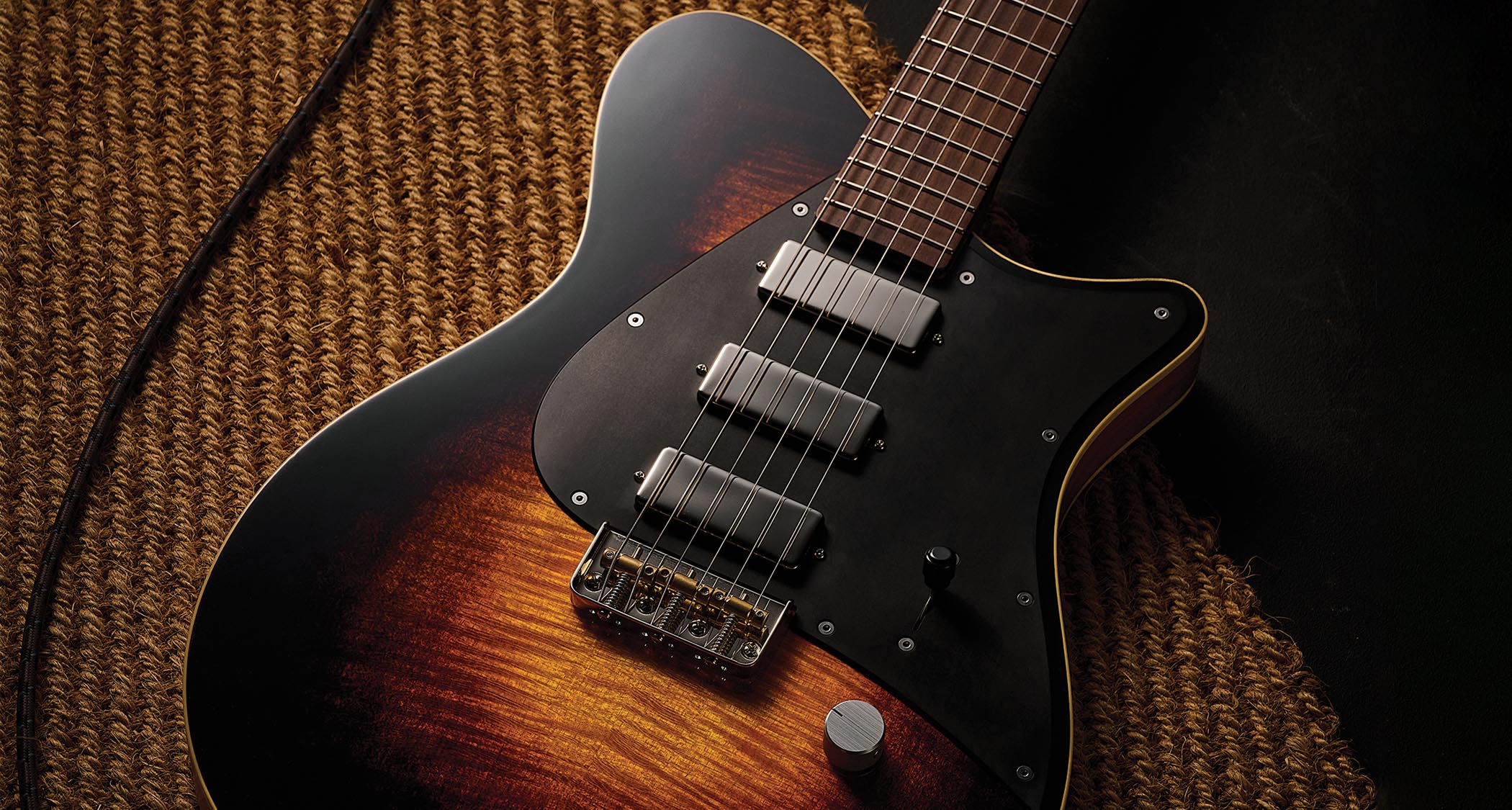Haggard Cat's Matt Reynolds: “Riffs are the most joyful thing about playing guitar – there should be more of them, all the time”
The guitarist for the UK hardcore innovators on how the Flying V shapes his personality as a player, his monstrous triple-amp rig, and the “joyful exorcism” of new EP, Cheer Up
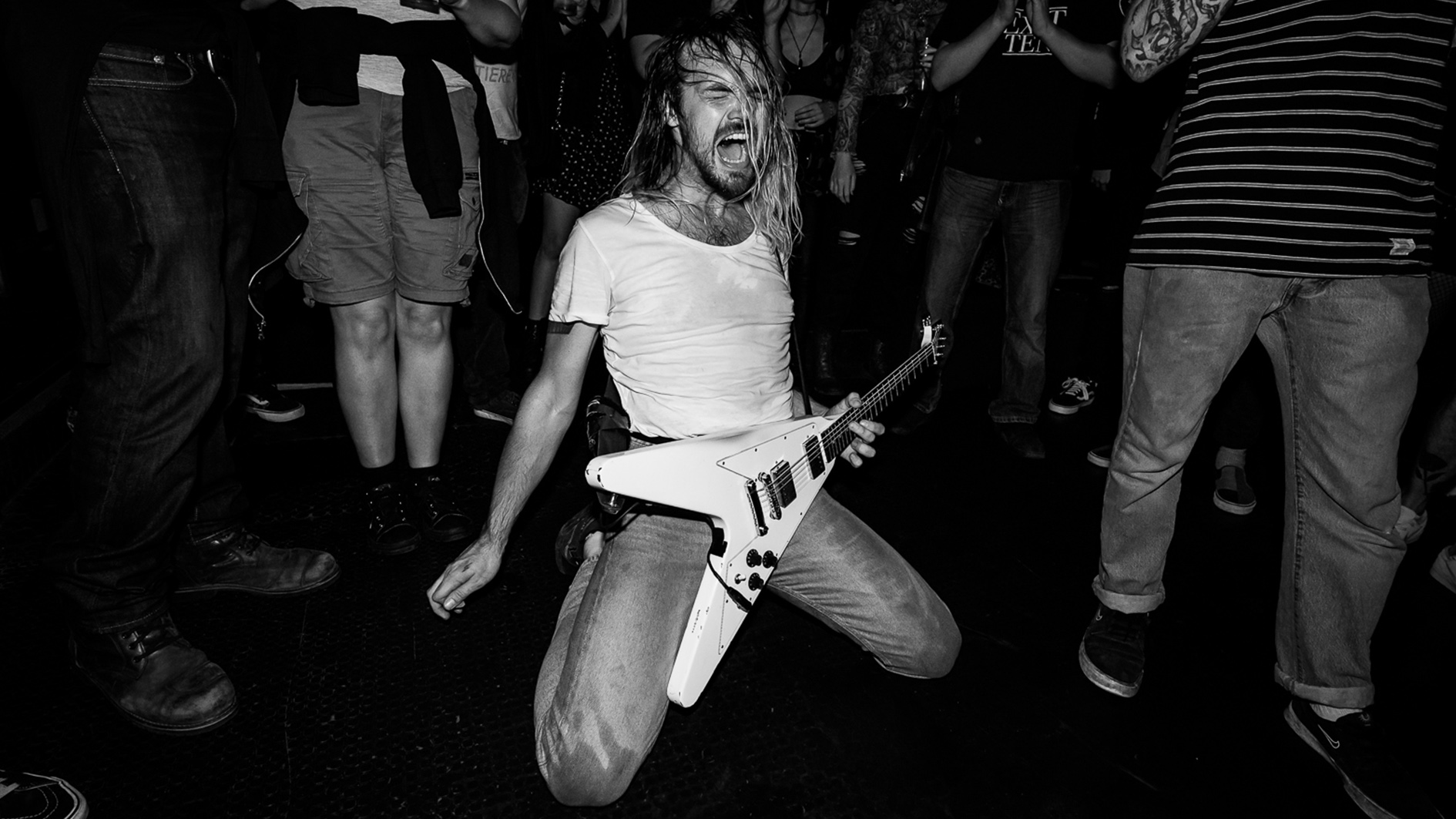
All the latest guitar news, interviews, lessons, reviews, deals and more, direct to your inbox!
You are now subscribed
Your newsletter sign-up was successful
Let’s get one thing straight at the outset: there is a dangerous propensity to think all two-piece guitar bands are blues duos. UK two-piece Haggard Cat are very much not another-fucking-blues-duo.
Guitarist/vocalist Matt Reynolds and drummer Tom Marsh have played together for years but first rose to prominence in their previous ‘math punk’ band, Heck. Their time in the group cemented their reputation as a live wrecking crew that would charge into audiences, guitars swinging.
That band was originally known as Baby Godzilla before a lawsuit led to a name change and, in many ways, their original moniker summed them up best.
Where Heck went, chaos would follow. The sort of unstable compound that wasn’t long for this Earth, they split in 2017. Since then, as Haggard Cat, Matt and Tom have since doggedly pursued a shared vision of an expansive and riff-drenched brand of hardcore punk, which maintains Heck’s vicious serrated edge but also – you know – remembers to breathe. The resulting sound lies somewhere between Refused, Pulled Apart By Horses, METZ and Lightning Bolt.
On their second album, 2020's Common Sense Holiday, Haggard Cat pursued their vision of a hardcore Dark Side of the Moon, which while critically acclaimed, led to disagreements with their label, Earache, and their eventual departure.
Now they’re out on their own and back with a new EP, Cheer Up, recorded with Foo Fighters and Muse producer Adrian Bushby. It is five tracks of the joyful sound of a newly empowered band thriving on its freedom and settling some scores in the best way possible – over the fretboard.
As they proclaim themselves on opener, Quit Your Jobs: “It’s genius, I’m getting carried out on their shoulders…”
All the latest guitar news, interviews, lessons, reviews, deals and more, direct to your inbox!
It’s been more than 10 years since you formed Heck (originally known as Baby Godzilla). I saw one of your very first shows in London and the best way to describe your guitar playing at that point was ‘hazardous’.
“Haha! There was a bit of spite to the playing, wasn't there?”
It was vicious. There were a lot of industry types and it felt like you wanted to take everyone’s heads off their shoulders. How you would describe your evolution as a player from those days?
“There has been an evolution, for sure. I'm probably more of a conventional player now, but I don't think I'll ever be a conventional player because I'm a moron. My approach to the instrument is always: ‘This is a tool. Hit tool. Make sound come out.’
“I think with Baby Godzilla [aka Heck], I would describe the guitar playing style as ‘panic’. Frantic panic. Get every idea out as quick as you can, in front of a crowd but also over-explain and get into their faces. I think it came from a real desire to be understood, but also to be instant at the same time.
We wanted to put as many layers into things as possible and make abrasive sounds, but fix them into really nice concise songs that made sense
“Now it's more about the journey, arriving at this huge moment where people kind of go, ‘Oh, yeah! I get it now.’ Instead of being, ‘If you don't get this instantly, I'm going to ram this headstock right down your throat!’ But I've always loved the guitar. Even back in those days, when it looked like it was a battle between me and it.”
What did you want to achieve with this new EP, Cheer Up?
“It sounds quite infantile, but what we always want to do is bigger, wider, and more dynamic. Compared to the last album, we wanted it to just be an affront. I think on Common Sense Holiday we approached our more sensitive side, but after the last 18 months, all we wanted to do was be instant again. We wanted to put as many layers into things as possible and make abrasive sounds, but fix them into really nice concise songs that made sense.
“Everything on there stems from the two of us just playing it live. All of the drums are from the live takes in the room and all of the guitar parts are from the room. But then I'd go and sit with Adrian and be like, ‘And another! And another! Is that a Mustang? I'm gonna use it! Amazing!’ It was revisiting that childlike, excited form of playing but introducing it into what we've learned [along the way].”
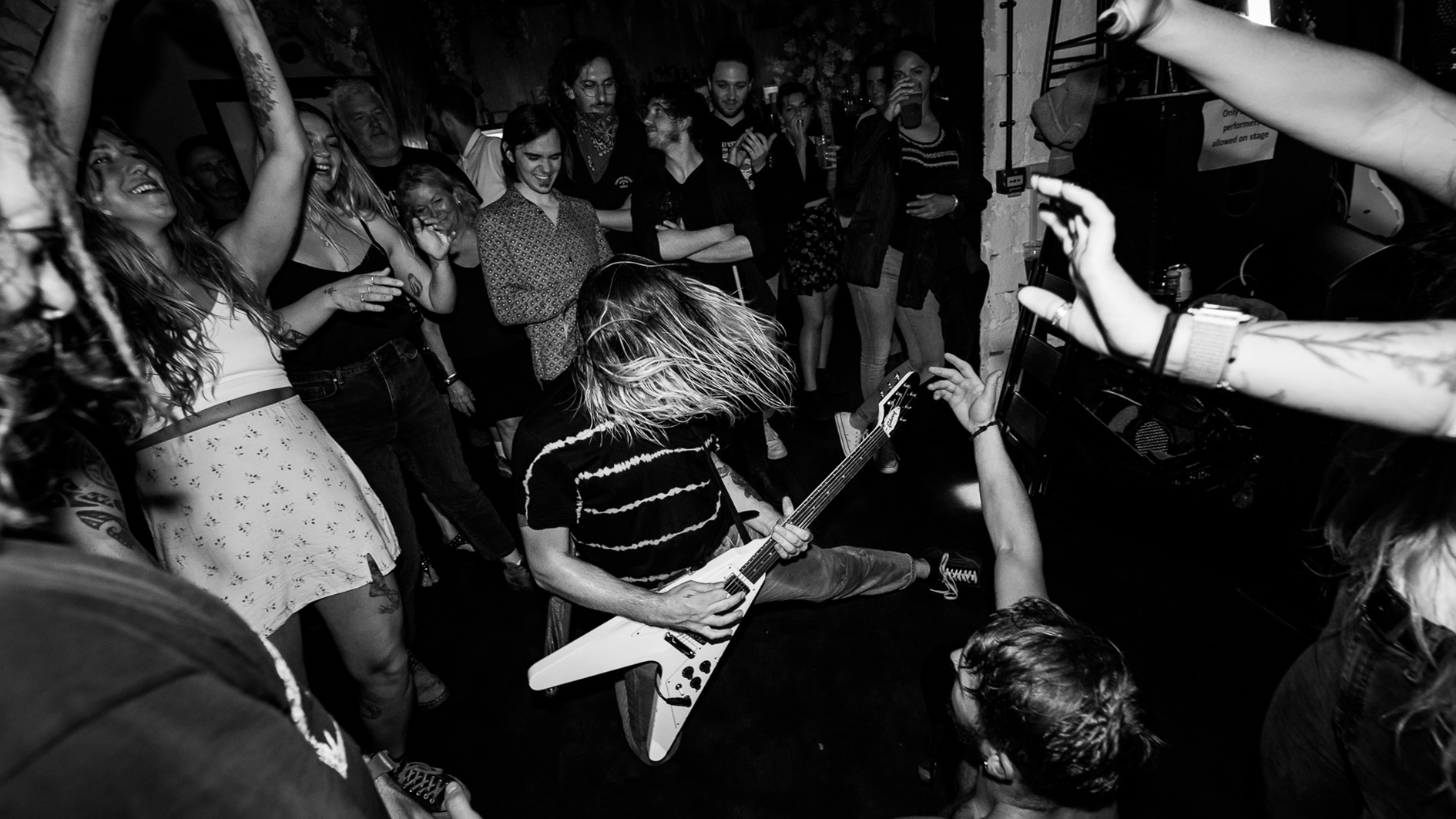
Your producer Adrian Bushby has worked with some big names – Foo Fighters and Muse among them – but what did he bring to the table?
“He’s the first producer we've ever worked with that has instantly looked at what we do and been like, ‘That's what we're going to do on the record.’ So we parked our shitty red van outside his amazing studio and he was looking at the gear coming in and was like, 'Right, set up like you're gonna play a gig.’
“So the drums were facing the amps, the amps were at gig volume, full blast, we’re looking at each other and he was like, 'Right, play us a song.' And I was like, ‘Really!? Because all the amps are facing the drums and there's gonna be bleed…’ And he was like, ‘Don't worry about that – that's my job! You guys just play.’
“And that's just the way it stayed for the entire recording, and I was kind of blown away by that. It wasn't someone looking at it like it was a problem to be solved. It was somebody looking at it like, ‘I’m going to capture this.’”
The relationship with some producers seems to revolve around ‘how can we get a clean signal?’
“That's so often just what happens. You should all work together, obviously. No-one wants to go into a studio to make anyone's life hard. I'm quite an apologetic guy – which I don't come across as a lot of the time – but if somebody is showing me body language, like there's a problem here, my gut instinct is to go, ‘Oh, what can I do? How can I help that?’
I hate to be a band that moans about the industry because we're choosing to be in it. If you don't like it, you can always just stop
“And the more that happens through a recording session, the more you’re like, ‘Oh I probably shouldn't suggest that…’ Which makes for a much less experimental and explorative way of working. I’m not going to kind of trash anyone else’s way, but it just so happened that the way that Adrian does things really rubbed me the right way!”
There are a lot of references to regaining control on the EP. Not least on Fucking TV, which has the lines: ‘Just give me six more like this and I’ll write the check myself’ and ‘You need a little repetition. A little less finesse.’ Things I'm sure a lot of readers will have heard themselves at various points. Why have you brought that to the fore here?
“Well, I hate to be a band that moans about the industry because we're choosing to be in it. If you don't like it, you can always just stop. But at the same time, there's some things that you just have to bring to light.
“Fucking TV, for example. That's not about something that's happened recently, but around that time in Baby Godzilla when we were doing those industry shows for the first time, we met a press agent who did our press for a year or so.
“We had a song called Powerboat Disaster, which was a stupid song that I wrote when I was a teenager and the whole premise behind it was, ‘Can we put a sea shanty in a song and it still be a hardcore song?’ And that was the whole idea. There was nothing smart or clever about it, but it was hook-y because it went ‘Yo ho ho!’
“So this press agent came up to me and, and he said, ‘Right, what I need you to do is give me six more Powerboats.’ And I was like, ‘I hate that idea! Why would I do that? We've already got one of those…’
“I would have only been 21/22. But I was already kind of thinking, ‘No, I don't want to stay in my lane. I want to have the full motorway!’ And I really, really hated that attitude. So that line comes from him, but every time you bump into someone in the industry, it's like they see the one thing that could work and go, ‘Right. How do we replicate this over and over and over again?’ But that's how you get a really soulless and unconsidered record.
“So yeah, that was Fucking TV. And more recently the label and us kind of butted heads and we walked away from that during lockdown. A lot of the process of the album prior, Common Sense Holiday, was really a struggle with us and the label.
“Once we walked away from it and realized our freedom again, it was almost like we can celebrate that freedom now. And hey, we can we can talk about it… It was like: ‘I'm angry.’ ‘I’m angry, too.’ ‘God, they were dicks.’ ‘Yeah, they were dicks.’ ‘Here's why they were dicks in five short songs!’”
I enjoyed your philosophical summary in the press release that ‘Yeah, the world sucks, but at least there's riffs.’
“Well I think the sound of the whole record is just joyful. The title itself, Cheer Up, is obviously supposed to be quite sarcastic. There's nothing in the world that makes me want to cheer up less than someone saying those words. It's like, ‘Shut the fuck up, go away!’
Riffs are the most joyful thing about playing guitar and there should be more of them, all the time. It is always the best bit of a song
“But also music is an escape and it should be this catharsis. Even if it doesn't do it for anyone else in the public, it does it for us! It makes it very, very fucking happy. We've done the sad thing now – the last thing the world needs is more moroseness. Let's celebrate music and let's celebrate our escape and let's have the big angry 'AAAARGH!’ A joyful exorcism.”
Speaking of riffs, do you have a favorite from the Cheer Up EP?
“I think some people look down on riffs. Lots of bands kind of mature and stop including so many riffs in what they do – but the way those bands always start is riffs! And it's always riffier at the start and less riff-y at the end. I hate that as a progression.
“Riffs are the most joyful thing about playing guitar and there should be more of them, all the time. It is always the best bit of a song. You know the meme where it's like the best compliment you can pay a musician is the stank face? That always comes from when a great riff hits in a song. That's where the stank face is!
“So there's a couple of bits on Cheer Up. But I think the riff towards the end of Water Me Down, I absolutely love. It’s this descending pattern that's on a guitar that's tuned in drop A. And the riff is over the two A strings in this descending pattern and I just absolutely love it. It's not big and it's not clever, but it just makes me go, ‘Bang your head! Now!’”
You're so right. Guitarists always say things like, ‘Yeah, I’m just doing partial chords and little phrases now…’ Essentially: ‘I don't do riffs anymore.’
“That sounds like a compromise, doesn't it? You want to leave the childish part of you that wants to do riffs behind? No you don't. That's not the point. Just become more clever about how you put them in!”
What is in your rig these days?
“I've had a lot of time over lockdown to overthink it and then to overthink again. So it has kind of evolved into a three-amp setup, whereas I was using two, historically. The guitar side is still taken care of by an Orange Thunderverb 200 through a 4x12 and a 2x12 [cab]. And it sounds huge and big and abrasive, and I love that.
“On the bass side of things, I take an old ’73 Fender Bassman and run that through an 8x10 [cab] and I take a third line out of the back of that bass amp, and run it through a kill switch, and then through a second octave pedal into what I call my 'sub rig'. That's an Orange Bass OB1-500 transistor amp.
“The reason I went transistor is because I've blown up two valve amps doing this, so I went right, ‘Okay. No more blowing up valves by trying to run this horrible three, or four octave-down frequency.’
I start with a Gibson Flying V. It's a dumb guitar, and I love it. It's the kind of guitar that you want all your life, and then you buy it and it changes your guitar playing personality a bit
“The OB1 500 seems to take it and that amp's job is basically just to rumble in key. In isolation that sounds like utter dogshit. But when you put that with everything that's going on, it just hits you where you want. So that's the three amps. It goes: guitar, bass, disgusting dirge underneath the bass.”
What about guitars? You seem to be using a Flying V pretty consistently in the videos…
“I start with a Gibson Flying V. It's a dumb guitar, and I love it. It's the kind of guitar that you want all your life, and then you buy it and it changes your guitar playing personality a bit. You can't help but be like, 'I am a god! Look at this stupid, V-shaped thing!' I love that. All that pretense just slips away: you grow your hair out again, you're everything that you've always wanted to be.
“So I start with the V, that's the skeleton of all those songs. And then me and Adrian would sit in the studio and be like, right, we'll add a Fender Mustang here. There's a Strat there. There's a Tele there. I think at one point on Quit Your Jobs there's a 12-string Rickenbacker, which was just sat there. And there's one part of that song that's an arpeggio chord. I was like, 'That's the 12 string, then!' Just so I can hear that bit and be like, 'That's a Rick-y!'
“That goes through to that childish kind of thing: ‘More is more.’ I'm going to play a Flying V and I'm gonna stop being apologetic for liking riffs and liking guitars.”
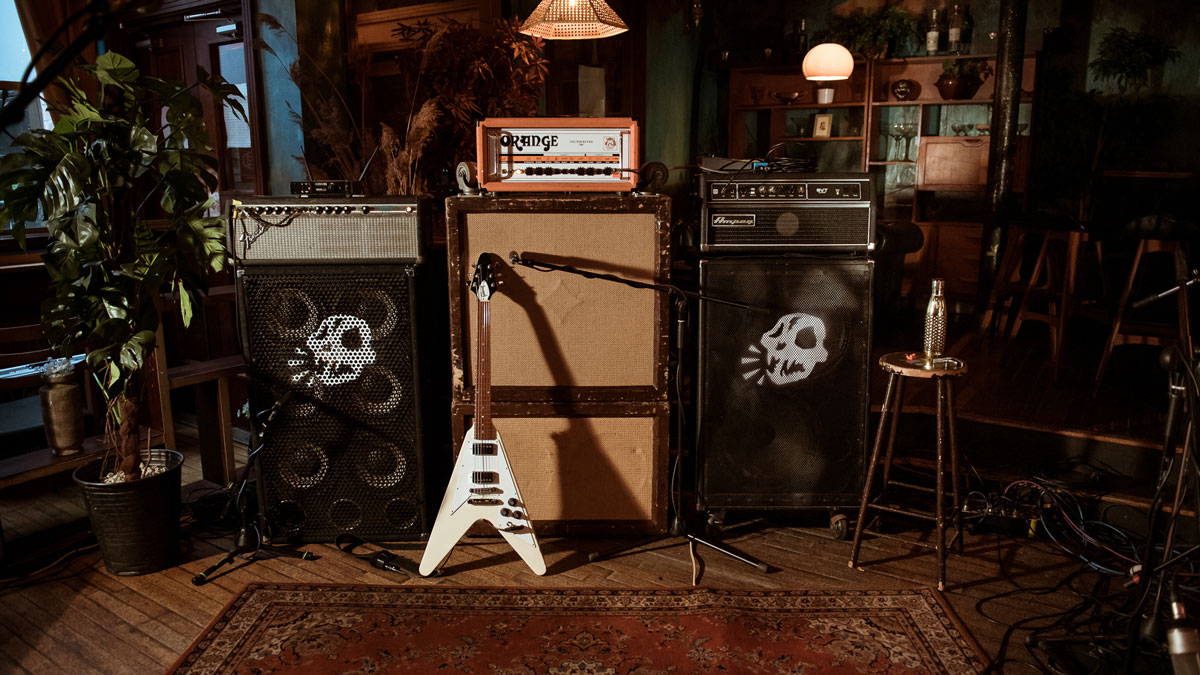
How are you splitting your signal? Do you have a particular pedal you favor for that?
“Yeah, I use a Radial [BigShot] ABY. They're a little bit pricier, but it's worth it. It has a really great buffered output that you can control really easily. A buffered output often sounds synthetic, but with that Radial it's quite responsive and faithful to what has been put in. I tend to run through a compressor first, into the Radial, and then my signal is split instantly. And then I treat my pedalboard like it's two. So I have a bass side of things, and a guitar side of things.
“One key pedal I use is an EarthQuaker Plumes, which I absolutely love. But rather than use that like an overdrive/distortion, I use it as a treble boost. So I just take all the overdrive off and treble right up. The danger with the ABY guitar/bass octave thing is everything can sound a bit too soupy.
“So if I want the guitar to push forward, I hit a treble boost, and then the guitar is suddenly sat at the front of the mix. And I love that. It sometimes gives you much more power than adding more bass layers would do.”
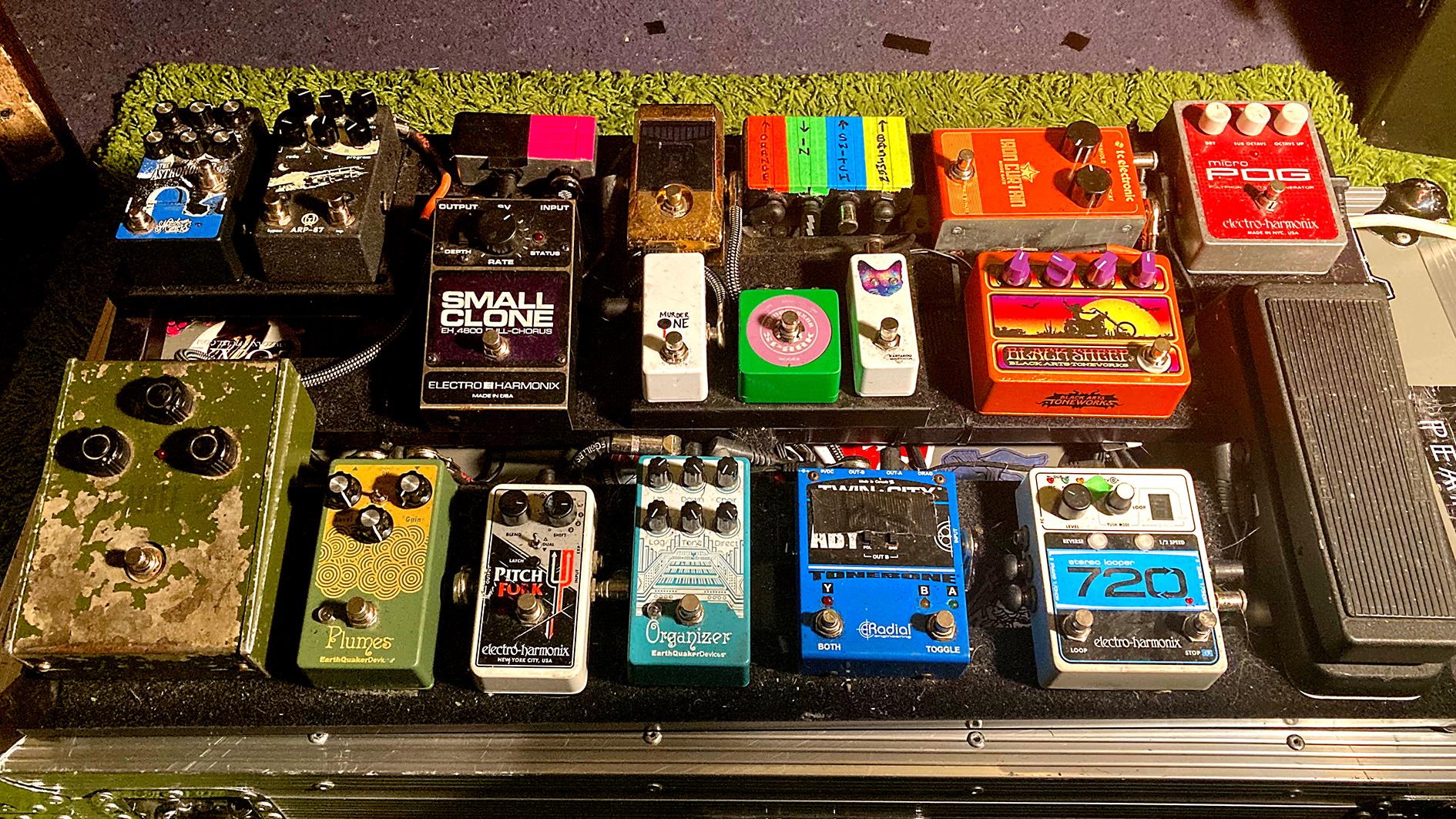
We’ve talked about your music industry experiences in terms of unsolicited or unhelpful advice, but what has what has rung true for you?
“I think it comes back to the idea that I mentioned earlier: that you don't have to do this! If you are just gonna sit and complain and be morose the entire time, feel free to just walk away. You can do that! But what keeps us here is our inherent kind of drag towards music – and we obviously love it. So what rings true is just remembering that. Remembering it is fun and you love it and you chose to do it!
“At this stage, no-one's forcing us to do it. There's no record label behind us, everything is on our own terms. So I think that's that's a good principle to keep you going through the years. 'Do you still like this? Are you doing this because you're in love with it?' If so, great. Cheer up!”
- Haggard Cat's new EP Cheer Up is out now.

Matt is Deputy Editor for GuitarWorld.com. Before that he spent 10 years as a freelance music journalist, interviewing artists for the likes of Total Guitar, Guitarist, Guitar World, MusicRadar, NME.com, DJ Mag and Electronic Sound. In 2020, he launched CreativeMoney.co.uk, which aims to share the ideas that make creative lifestyles more sustainable. He plays guitar, but should not be allowed near your delay pedals.

